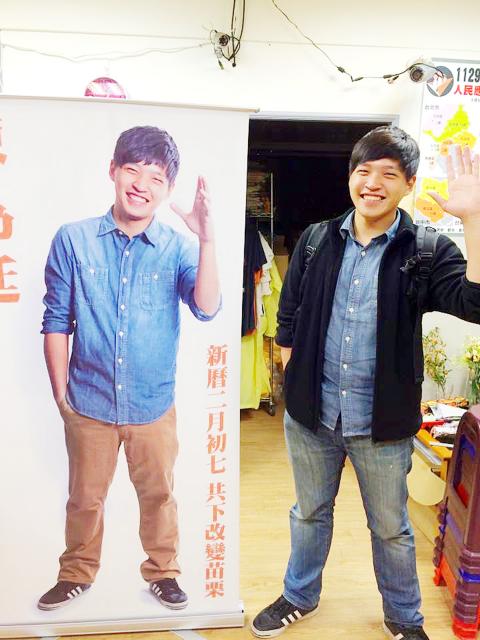A revelation by Sunflower movement leader Chen Wei-ting (陳為廷) that he once groped a female passenger’s breast on a bus has sparked heated debate among netizens, who had mixed views.
In an interview with the Chinese-language Liberty Times (the Taipei Times’ sister newspaper) published yesterday, Chen, who is running for legislator in the by-election in Miaoli County in February, was asked to discuss his potential risk of falling victim to “attacks on his personal integrity,” to which he responded by making the revelation, saying: “There are things that I have kept to myself for a long time.”
“One day, during the summer vacation before my senior year in college, I groped the bosom of a female passenger sitting next to me on public transport and was taken to a police station. Sometime later, I had improper physical contact with a female on the dance floor at a night club, for which I underwent mental health consultation at the order of school administrators,” he said.

Photo from Lin Fei-fan’s Facebook page
Some netizens condemned Chen, with one saying that touching a woman’s body without permission — whatever the reason — without her permission is exactly what “subway gropers” do.
“He is just afraid that these incidents will impact his campaign when they are exposed, so he might as well reveal it now,” one said.
National Taiwan Normal University professor Wu Chia-cheng (吳家誠), referring to Chen’s previous act of throwing his shoe at Miaoli County Commissioner Liu Cheng-hung (劉政鴻) to protest against the county government’s forced demolition of four houses in Dapu Borough (大埔), criticized Chen on Facebook, saying: “He throws his shoe at someone when he is mad and gropes women’s bosoms when he is high. He is dangerous.”
Others expressed support for Chen and said he showed courage by confessing his past wrongdoing.
“I was very shocked when I heard [Chen’s confession],” Defend Miaoli Youth Alliance member Yu Chieh-min (游捷閔) said.
Knowing Chen on a personal level, Yu said he has many shortcomings, but she also commended his courage in admitting what he did.
“It shows that he is not afraid to admit that he was wrong and is willing to improve. I believe he will adopt a more mature attitude toward women. He has not lost my support,” she said.
Using former US president Bill Clinton as an example, Chinese dissident Wang Dan (王丹) said Americans could forgive Clinton because they elected him as they believed him to be capable of handling public matters, not because they saw him as a moral exemplar.
Chen’s fellow Sunflower movement leader Lin Fei-fan (林飛帆) said he had known about the incident for a long time. Lin lauded Chen for having the courage to face his own demons, even though he said he did not think Chen’s mistakes could be rectified by his engagement in social issues.
Prosecutors who handled the case three years ago said Chen touched a female passenger’s breast while she was sleeping on a Taipei-bound Hsin Chu Bus in July 2011, adding that the woman awoke and shouted for help, after which the bus driver stopped the vehicle near Chongqing N Road Sec 3 in Taipei and took Chen to a police station.
Chen was given probation, with the complainant’s consent, prosecutors said.

SECURITY: As China is ‘reshaping’ Hong Kong’s population, Taiwan must raise the eligibility threshold for applications from Hong Kongers, Chiu Chui-cheng said When Hong Kong and Macau citizens apply for residency in Taiwan, it would be under a new category that includes a “national security observation period,” Mainland Affairs Council (MAC) Minister Chiu Chui-cheng (邱垂正) said yesterday. President William Lai (賴清德) on March 13 announced 17 strategies to counter China’s aggression toward Taiwan, including incorporating national security considerations into the review process for residency applications from Hong Kong and Macau citizens. The situation in Hong Kong is constantly changing, Chiu said to media yesterday on the sidelines of the Taipei Technology Run hosted by the Taipei Neihu Technology Park Development Association. With

CARROT AND STICK: While unrelenting in its military threats, China attracted nearly 40,000 Taiwanese to over 400 business events last year Nearly 40,000 Taiwanese last year joined industry events in China, such as conferences and trade fairs, supported by the Chinese government, a study showed yesterday, as Beijing ramps up a charm offensive toward Taipei alongside military pressure. China has long taken a carrot-and-stick approach to Taiwan, threatening it with the prospect of military action while reaching out to those it believes are amenable to Beijing’s point of view. Taiwanese security officials are wary of what they see as Beijing’s influence campaigns to sway public opinion after Taipei and Beijing gradually resumed travel links halted by the COVID-19 pandemic, but the scale of

A US Marine Corps regiment equipped with Naval Strike Missiles (NSM) is set to participate in the upcoming Balikatan 25 exercise in the Luzon Strait, marking the system’s first-ever deployment in the Philippines. US and Philippine officials have separately confirmed that the Navy Marine Expeditionary Ship Interdiction System (NMESIS) — the mobile launch platform for the Naval Strike Missile — would take part in the joint exercise. The missiles are being deployed to “a strategic first island chain chokepoint” in the waters between Taiwan proper and the Philippines, US-based Naval News reported. “The Luzon Strait and Bashi Channel represent a critical access

Pope Francis is be laid to rest on Saturday after lying in state for three days in St Peter’s Basilica, where the faithful are expected to flock to pay their respects to history’s first Latin American pontiff. The cardinals met yesterday in the Vatican’s synod hall to chart the next steps before a conclave begins to choose Francis’ successor, as condolences poured in from around the world. According to current norms, the conclave must begin between May 5 and 10. The cardinals set the funeral for Saturday at 10am in St Peter’s Square, to be celebrated by the dean of the College